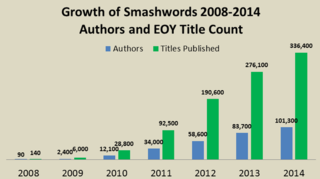
(This article was originally posted in my newsletter - Claudia's Corner. You can sign up for the newsletter by clicking here.) What the heck is happening with publishing? As readers, you have a vested interest in what's going on in the world of publishing. Most of my team at Cook Street Publishing has been involved in publishing since 2001. We've watched this market grow and fall. This year is a doozy. Here are the top three situations we saw develop last year. 1. Book sales were flat in 2014. In fact, publishing sales (as a whole) have been stagnant since the last quarter of 2012. If you dial down into the US GDP, you'll find that intellectual property (publishing) was down the entire year in 2014. 2. The eBook market crashed in 2014. This is actually what Hachette and Amazon were bickering about -- the loss of profits in a falling market. Why did this happen? Many people blame Amazon's Kindle Unlimited (KU) for the drop in sales; other people say that the market is bloated with indie authors.

We believe it's a cross of two things: a) stagnant sales due to the financial squeeze most people feel right now, which makes books a luxury, and b) the market was artificially strong because people were purchasing libraries for their first gadget. Amazon and most Wall Street traded publishers don't share their sales data. However, as an eBook distributor, Smashwords gets the best overview of the whole publishing market. Smashwords' Mark Coker does an excellent review of review of what's going on with eBooks here. You can read his predictions for 2015 here. Of course, the entire discussion of "what's wrong with publishing" would be incomplete without a mention of high-frequency trading. In the not so recent past, publishers spent their profits on their business -- hiring the best editors, supporting authors, and developing careers. High-frequency trading is a type of stock trading which forces corporations to focus on their stock price at all costs. Thus, profits from publishing are siphoned off to high-frequency traders (usually hedge funds) instead of returned to the business. It's our belief that this Wall Street hijinks will continue to destroy the larger publishers.This business model has led to the proliferation of small publishers (now more than 500,000) like Cook Street Publishing!

3. All writers are freelancers. When we started Cook Street Publishing in 2008, there were published authors (those published by the then 6 Wall Street Traded publishers) and independent authors. Everything changed in December, 2008 when the publishers fired more than half of their professional staff. Fast forward to 2014, established authors are independently publishing their backlist. Independent authors are getting contracts to write books with larger publishers. On the publishing side, large publishers have reduced multi-book contracts or let authors out of their long term contracts. Some bestselling authors are now publishing in their own companies. In recent years, the number of publishers has risen from 50,000 to more than 500,000 publishers. There is no longer a distinction between independent authors and "published" authors. The key question is where an author wishes to take his or her career. The sky is the limit as long as you remember that skydiving is dangerous. The only exception to this is the textbook market. These large publishers continue to do business as they have for the last 300 years. Now that you can rent your textbook, this market is expected to undergo similar changes.
What does this mean for readers?
It's very simple. If you like an author, support them the way you support us. You are amazing people -- the best readers in the world. You've made a huge difference in my life. You can be the difference between an author giving up on writing and continuing to write. What can you do? Buy books. Write reviews. Sign up to be a patron. Subscribe to author's email lists. Follow them on Facebook and/or Twitter and say nice things. Tell your friends and colleagues about them. Repin their book covers. Recommend their work to your local library. Whether your favorite author is a published author or an independent author, authors need your financial support. It's hard to make a living as an author and will only get harder. The truth of the matter is that a lot of authors will stop writing. You can keep this from happening by supporting your favorite authors. Your support can make a difference. How has this affected Cook Street Publishing?

While we don't have the exact figures yet, in 2014, Cook Street Publishing made less than half of
what we made in 2013. The writing is on the walls. We need to change with the times. In response to all of these changes, our team at Cook Street Publishing is reformatting the way we do business. We are a small team, so it's easy for us to move quickly and efficiently.There will be more on that as 2015 unfolds. -----
